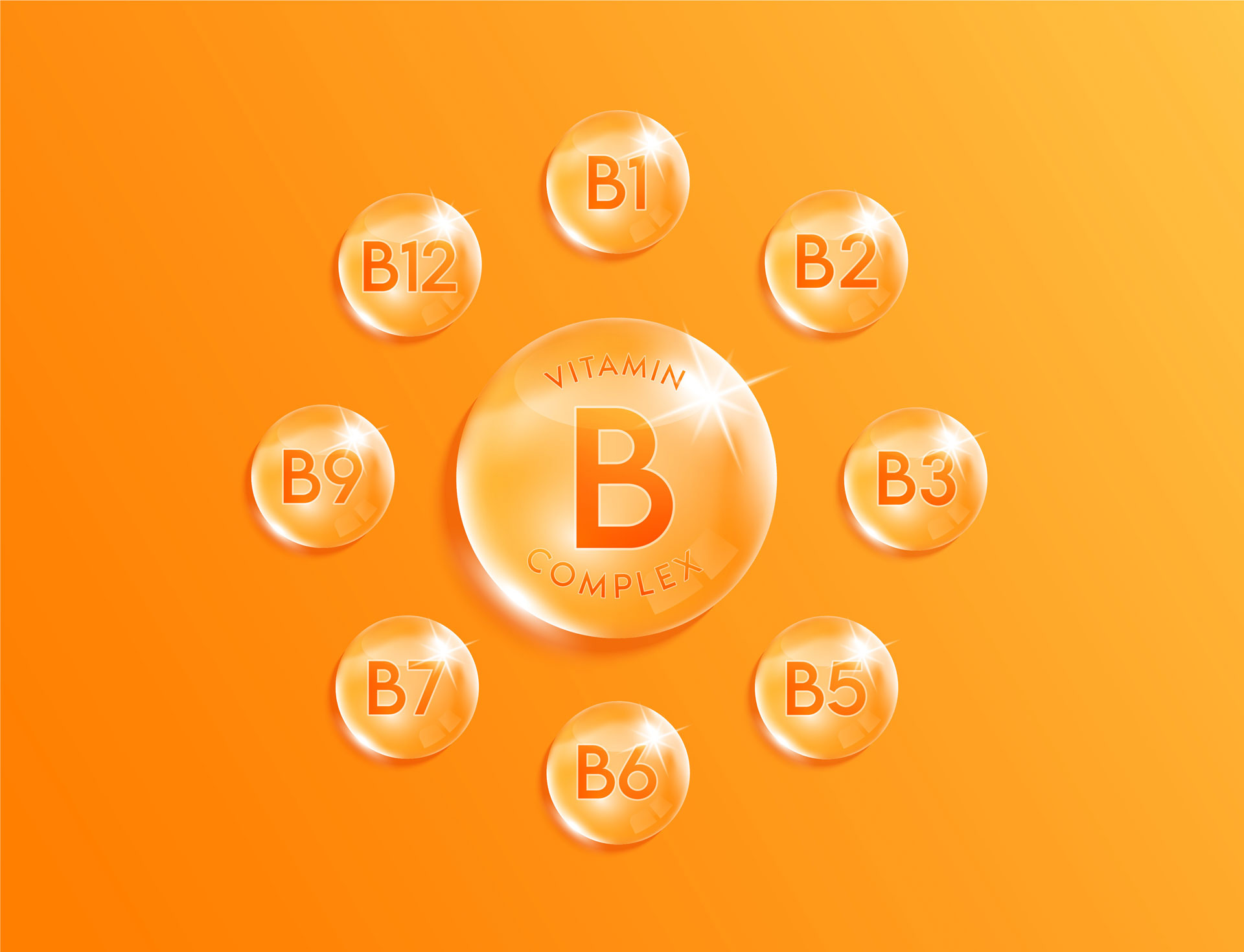B Vitamins
The B-vitamin group consists of eight distinct vitamins that must all be obtained through the diet. Although their functions differ, there is some overlap. They support mental clarity and memory, healthy hair and nails, a regulated energy metabolism, effective immune defence, and cellular division.
B vitamins are water-soluble and sensitive to heat. Consequently, a significant portion of these vitamins is lost during food preparation. For example, milk loses 30% of its vitamin B12 content after just two minutes of boiling, while vegetables may lose 50-90% of their folate (vitamin B9) content when cooked for a prolonged period.
Therefore, proper food preparation is essential to preserve these nutrients.
Foods that Support Optimal Vitamin B Intake
Foods rich in vitamin B6 include chicken and pork, fish, avocados, walnuts, peanuts, spinach, potatoes, and wholegrain products.
Folate is predominantly found in wheat germ, wheat bran, spinach, lettuce, egg yolk, liver, and broccoli.
In contrast, high amounts of vitamin B12 are found exclusively in animal-based foods, such as beef liver, pollock, eggs, milk, and dairy products. Although fermented plant-based foods (e.g. sauerkraut, fermented soy products, pickled vegetables) may contain trace amounts of B12 due to bacterial fermentation, they are not sufficient to meet dietary requirements.
As a result, individuals who avoid animal products – such as vegetarians or vegans – are at increased risk of vitamin B12 deficiency.
Wheat bran and wheat germ are especially rich in nearly all B vitamins (except B12), and wheat germ additionally provides large amounts of vitamin E, all essential amino acids, and minerals such as zinc. Legumes such as lentils, chickpeas, and beans are also protein-rich and provide a wide range of micronutrients including B vitamins, selenium, and iron. These foods should be consumed regularly and in variety, alongside fruits and vegetables.
Table: Overview of B Vitamins
Nutrients | Functions/Properties | Food Sources | Recommended Daily Intake | Deficiency Symptoms |
Vitamin B1 (thiamine) | Carbohydrate and amino acid metabolism, nerve impulse conduction | Outer layers of all grains/wholegrain products, legumes, potatoes, meat, brewer’s yeast | ♂ 1.1-1.3 mg ♀ 1.0 mg
| Loss of appetite, irritability, neuropathy, muscle weakness |
Vitamin B2 (riboflavin) | Energy metabolism, antioxidant function (GSH reductase), detoxification of xenobiotics (e.g. medicines, pesticides) | Brewer’s yeast, liver, meat, fish, eggs, milk and dairy products, vegetables (kale, broccoli) | ♂ 1.3-1.4 mg ♀ 1.0-1.1 mg
| Light sensitivity, inflammation of oral mucosa and tongue, angular stomatitis, muscle weakness |
Vitamin B3 (niacin) | Energy metabolism, synthesis of cholesterol and steroid hormones, blood sugar regulation | Wheat bran, liver, meat, wholegrain cereals | ♂ 14-16 mg ♀ 11-13 mg
| Poor appetite, muscle weakness, bright red tongue, angular stomatitis, red cracked scaly skin |
Vitamin B5 (pantothenic acid) | Component of coenzyme A, energy metabolism, steroid synthesis, haem synthesis | Calf’s liver, brewer’s yeast, peanuts, mushrooms
| 6 mg | Fatigue, impaired wound healing, susceptibility to infections, gastrointestinal complaints, burning foot pain |
Vitamin B6 (pyridoxine) | Protein and amino acid metabolism, neurotransmitter synthesis, homocysteine regulation | Chicken, pork, fish, avocado, walnuts, peanuts, spinach, potatoes, wholegrain products | ♂ 1.6 mg ♀ 1.4 mg
| Irritability, nervous disorders, hypochromic anaemia, microcytic anaemia, hyperhomocysteinaemia, red scaly skin, muscle weakness, peripheral neuropathy |
Vitamin B9 (folate/folic acid) | Cell formation, embryogenesis, haematopoiesis, homocysteine regulation | Wheat germ, wheat bran, spinach, lettuce, egg yolk, liver, broccoli | 300 µg | Pallor, impaired erythropoiesis, hyperhomocysteinaemia, pregnancy complications (e.g. miscarriage, neural tube defects) |
Vitamin B7/H (biotin) | Blood sugar regulation, fatty acid synthesis, gluconeogenesis | Brewer’s yeast, liver, egg yolk, nuts, soya beans, rice, cereals | 40 µg | Weakness, hair loss, brittle nails, dry scaly skin |
Vitamin B12 (cobalamin) | Homocysteine regulation, erythropoiesis, DNA synthesis | Beef liver, pollock, eggs, milk and dairy products | 4.0 µg | Pale skin and mucosa, impaired erythropoiesis, hyperchromic anaemia, macrocytic anaemia, susceptibility to infection, neuropathy, hyperhomocysteinaemia |


